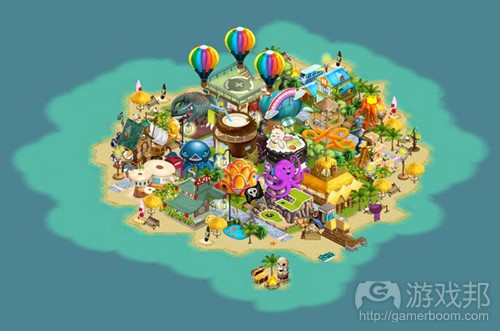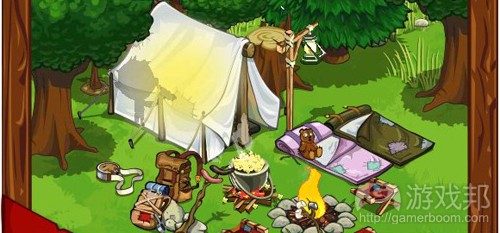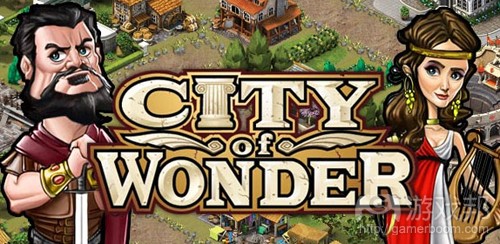三大传统领域开发者看好社交游戏发展前景
作者:Paul Hyman
传统游戏开发者总是很鄙视那些Facebook平台上的游戏,认为它们都是一些“斯金纳箱”(游戏邦注:斯金纳箱,是新行为主义心理学的创始人之一的斯金纳为研究操作性条件反射而设计的实验设备),只是通过一些事先设置好的机制以奖励用户那些反复点击进行的行动。有些批评家称这种重复行为只能勉强称得上是一种活动,而不是游戏,它们太过于简单,经常没完没了地重复同样的内容。而且绝大多数这种游戏都是以商业模式为核心,而非出于娱乐目的而设计。
但是现在,这些反对者必须换个角度来看待这些游戏了。如今,Facebook上的游戏变得越来越复杂精细,且与“真正的游戏”性质越来越接近了,着实反驳了那些不看好Facebook领域的传统游戏开发者们。
以下是Facebook上三大知名游戏开发者对这一领域的看法:
社交游戏开发商Lolapps自从与Facebook合作以来共在这个平台上推出了11款游戏。Brenda Brathwaite作为Lolapps的创意总监,早在1981年就开始开发游戏,并在这长达20多年的时间里参与推出了22款游戏。
Brathwaite说道:“Facebook上的游戏与硬核游戏的最大不同就在于,硬核游戏属于同步进行的游戏,即玩家也许会花一整个礼拜的时间什么都不干就专注于玩《Civ V》这款硬核游戏。但是Facebook上的游戏,也就是社交游戏则更趋向异步化,或者可以说是一种合理安排好的游戏,即玩家可以没有任何场所限制,随时玩游戏。玩家可以每次花5分钟玩游戏,并且一天玩5次游戏。”
但是这两种类型的游戏规则却并未有太大差别。
“在Facebook上的游戏中,玩家主要是登陆游戏,然后一直点击游戏,并最后完成游戏,同时期许能从游戏中获得相应奖励。但是说实在的,绝大多数游戏都是基于这种玩法进行的。举个例子来说吧,在我们的游戏《Critter Island》中,玩家就必须在游戏中收集齐几百颗星星才能赢得游戏。我发现在不断寻找星星的过程中能够不断感受到游戏的乐趣,虽然说不上为什么,但是我却一点都不在乎原因。同样的,在像《魔兽世界》这种打斗游戏中也能感受到许多游戏乐趣。这些游戏的乐趣根源在哪里我一点都不关心,我只在乎的是它们能够让我得到放松,并心情愉悦。我不会因为花费20分钟在游戏中而抱怨没有时间阅读《尤利西斯》(游戏邦注:爱尔兰意识流文学作家詹姆斯·乔伊斯小说名)。我玩游戏也不是出于任何社交目的。只要游戏好玩,我就会去尝试。我想这也正是那些不断点击休闲游戏的玩家心里的共同想法吧。”
但是除了漫无目的地点击游戏外,还有很多玩家对游戏抱以更多的期望。而这也正是推动很多Facebook游戏开发者制造更多不同游戏的原因。
Brathwaite解释道:“这就是为什么《FarmVille》和《YoVille》等游戏正不断地添加新的游戏机制,以吸引更多用户群体的原因了。这些游戏的设计变得越来越复杂,玩家在游戏中的体验也越来越丰富,例如游戏中还添加了招聘机制等。在游戏中我不仅能和好友相互协作,我们还会为了一些共同的目标而努力。”
“这些本来盛行于传统游戏中的理念也开始影响着一些新的游戏,而正是在这种环境下,我们发行了《Critter Island》。我们清楚地知道自己的游戏并不具备那些很有吸引力的图像,我们也并未参与3D游戏领域的竞争,因为在Facebook这个平台上并不适合发展这种类型的游戏,所以我们选择在2D游戏领域施展拳脚。”
Brathwaite认为“用户留存功能”是更复杂的功能,无论这种功能是否拥有额外的社交互动性,都必须使玩家拥有更多的选择机会,且让他们能够获得更大的成就感。
“游戏开发者最想达到的目标就是留住玩家,所以他们就必须不断地改进游戏。如果玩家完成了一款游戏的所有内容后就无事可做了,他们便会对该游戏感到厌烦,并离开游戏。而这时开发者能做的就是不断改进游戏,想尽办法再次吸引用户。”
作为另外一名“真正的游戏”开发者,布莱恩·雷诺兹(Brian Reynolds)加入Zynga并担任该公司首席游戏设计师后,就开始积极投身Facebook游戏领域。布莱恩制造了Facebook上大热的一款游戏——《FrontierVille》。在此之前,雷诺兹也曾亲自操刀一些数百万份销量的策略类游戏,包括《Civilization II》,《Rise Of Nations》和Sid Meier的《Alpha Centauri》。
雷诺兹驳回了那些对于社交游戏的批评,他明确称这还是一个较为年轻的产业,在这个日新月异的时代里,并不是所有传统游戏都能跟得上时代的变化。
他说道:“当玩家越来越熟悉这个平台时,他们便能更清楚地感受到社交游戏的趣味性和精致性。”
雷诺兹认为,绝大多数批评社交游戏的言论都是来自于那些大型游戏开发者,他们投入了大量的时间以制造大型,昂贵且复杂的游戏,所以他们认为这种小型的社交游戏根本不能算是一种游戏。
“有趣的是,作为一名游戏制造者,我认为比起AAA游戏领域,在社交领域才能创造真正的游戏设计,这也是我转向社交游戏的原因之一。因为在AAA游戏领域里,开发者需要花费3到4年的时间去整合技术,艺术表现和游戏效果以及音乐和音效等。你实际上的游戏玩法设计成本,其实仅占这3000万美元预算的一点零头,而且我也曾经历过花费了数个月的时间却仍未设计出一款真实的游戏的经历。”
雷诺兹称Facebook上的游戏制造者多数受到了“频带宽度限制”。“游戏制造者必须使游戏能够在短短的2,3秒间打开后,快速吸引玩家的注意。但是我必须强调这是件非常困难的事!游戏开发者必须关注的并不是他们的游戏图像有多么吸引人,或者他们使用了何种高超的开发技术,而是应该侧重游戏玩法的设计和游戏中互动性的优化。而这也正是我最自豪的地方。”
雷诺兹认为,自从3年前猜字游戏和益智游戏出现以来,Facebook上的游戏已经发展到了一定的程度。去年Facebook上的三款热门游戏《FarmVille》,《Café World》和《FishVille》都是来自于Zynga旗下,虽然这些游戏都很简单,但对玩家来说却仍然具有很大的吸引力。
雷诺兹继续说道:“如今我们在Facebook上的游戏已经吸引了大量的玩家,所以我们计划开始制造一些不是很困难但是却能够娱乐玩家,且帮助他们与他人互动的游戏。就像一些新的平台正在投入大量的时间研究如何制造能够娱乐玩家的游戏,而我们很荣幸已经快接近这个目标了。”
雷诺兹表示,Zynga旗下最复杂的游戏应该算是2010年6月份发行的《FrontierVille》。这款游戏与《FarmVille》有很多相同点,但是它的游戏角色不再是农民,而是早期美国西部的拓荒者。
“这款游戏大大超过了之前这种类型的游戏所取得的成绩。所以,从那时起我们便开始把关注焦点转向不同的游戏新玩法,并更加重视游戏的互动性等问题。”而且因为《FrontierVille》中融入了很多开拓者的故事因素,玩家可以在游戏中选择各种各样的游戏活动,并且游戏中也贯穿了很强的社交性,即玩家能够在游戏活动中与朋友相互协作,并赢得游戏。”
“如果你先玩15分钟的《FrontierVille》再玩15分钟的《FarmVille》,你将能发现这两款游戏的难度级别的不同之处。我认为,不只是我们的玩家会喜欢这款新游戏,甚至那些批评我们不会制造‘真正的游戏’的批评者也将会喜欢这款游戏。”
Steve Meretzky也同意上述观点。Steve Meretzky作为Playdom公司设计副总裁,因为早前制造Infocom游戏和最近的PC游戏《动物园大亨》(Zoo Tycoon)而大受瞩目。他最近也把Playdom旗下游戏的侧重点放在了Facebook这个平台上,并且清楚地看到了Facebook上游戏的复杂性正在不断发生变化。
他说道:“Zynga这两款游戏确实可以称得上是Facebook游戏不断进步的标志之一。乍一看这两款游戏确实有着异曲同工之处,但是当深入玩游戏时,将能够发现《FrontierVille》更有深度,且更复杂,而且因为游戏中的抚养动物,建造城镇和寻找瓦片等设置,使得这款游戏的趣味性也一点都未减弱。”
“这两款游戏拥有一些相同的游戏机制,但是因为与《FarmVille》相比较,《FrontierVille》改进了一些游戏机制,显得更加完善,所以我更喜欢这款新游戏。也许有的人会说《FrontierVille》并没有比《FarmVille》进步多少,但是那都只是他们的主观想法而已,不是吗?”
Meretzky认为社交游戏的最大弊端就是它所侧重的单一玩家游戏体验。在这种类型的游戏中,社交性并未真正融入到游戏中。
“我们虽然大大地提高了游戏的质量,但是却忽略了这种游戏的本质所在,即社交性,也并未能好好利用Facebook平台上所支持的病毒式传播渠道。”
“在Playdom最近的游戏《City Of Wonder》中,我们在游戏设置中平分了城市文明和模拟城市两个因素,并使用了一个有趣的机制以推动该游戏的社交性,即在玩家的城市中设置了一座代表好友的建筑。当玩家的好友访问他的城市时,那座好友建筑便能升级,且样式也会变得更加好看。虽然这只是一个较小的改善,但是却可以称得上是一个很棒的变化。”
Meretzky认为那些批评Facebook游戏在提高复杂度这条道路上的速度太慢是不合理的。因为整个社交游戏领域的发展历史才只有短短的3年时间,它还只是一个非常年轻的领域。
他说道:“虽然从最初的电子游戏发展至今已经有3年的时间了,但是我们却仍然停留在《Pong》(游戏邦注:一款非常耐玩的益智过关游戏,跟弹珠台差不多,不过玩家们的目的是攻破对方大门)时代里。确实,从2007年,
我们已经从三四十年前历史的游戏技巧中脱离出来,开始使用更高级别的游戏制作技巧。但是说真的这三年里我们确实取得了很大的进步。Facebook上的游戏变得越来越精致,游戏设置也更加复杂,游戏开发准入门槛更高了。而且我有预感,这种发展趋势将会一直持续下去。”
“我不想听到任何把Facebook上的游戏比作‘斯金纳箱’的言论。其实,如果当玩家只能从游戏中获得乐趣而已,那么所有的游戏都可以被称作‘斯金纳箱’。因为在传统游戏或者更复杂的视频游戏中,‘斯金纳箱’因为潜伏在更深的领域,所以玩家看不到;但是因为社交游戏较为简单,各种游戏机制也都很明朗,所以我们才能看到它的‘斯金纳箱’吧。”
Meretzky认为,当越来越多的传统游戏开发者开始转变方向,并加入他们(还包括Brathwaite和雷诺兹)的行列,那么关于社交游戏的批评言论也将会大大减少了。
“因为一般情况下,人们都不会去批评那些与自己在做相同事情的人。”(本文为游戏邦/gamerboom.com编译,如需转载请联系:游戏邦)
Facebook Games Level Up
by Paul Hyman
Developers of traditional games often dismiss titles on Facebook as mere “Skinner boxes” — devices that use scheduled reinforcement to reward repetitive actions. They are activities, not games, say critics, who call them too simplistic, too repetitive, too “grindy.” And they are driven by the business model — not by the fun.
But it may be time for naysayers to take another peek. Facebook games have grown increasingly sophisticated and could become the equivalent of “real games,” leaving critical developers in the dust.
At least that’s what three high-profile Facebook game developers predict.
Take Brenda Brathwaite, who has been creative director at Lolapps — a developer of 11 Facebook games — for five months now, but who has been in game development since 1981, during which time she was credited on 22 game titles.
“The main difference is that the typical hardcore game is designed for synchronous play — for instance, you could easily take the next week off and do nothing but play Civ V,” she says.
“But so-called Facebook — or social — titles are designed for asynchronous, scheduled, or appointment gaming that is conducive to a little play here, a little there. They are for people with, say, five minutes of game time, five times a day.”
However, the rule sets are frequently not all that different, she says.
“In a Facebook game, people basically go in, they click, click, click, click, click, and they get out, hopefully with some kind of a reward. But it’s easy to say that about any kind of game. Take Doom. You click, click, click, click, click and blow shit up. In our game Critter Island, you need to collect hundreds of stars. I find it endlessly amusing picking those things up. Why? I don’t know. And I don’t care.
“Likewise, I find it endlessly amusing to beat on creatures in World of Warcraft. Why? Who knows? In all these examples, it’s just something relaxing and enjoyable for me to do. I don’t look at the 20 minutes I’ve blown and say, ‘Damn! I could have been reading Ulysses! I don’t necessarily think games must have some higher social purpose. As long as they are fun, I’m okay with that… and so are many gamers out there for whom casual clicking is exactly what they want.”
But others crave something beyond mindless clicking, which is the reason some Facebook developers are creating alternate choices.
“That’s why games like FarmVille and YoVille are increasingly adding new mechanics to keep the user base interested,” Brathwaite explains. “The designs are becoming more complex and giving players more and more to do — like recruitment mechanics, for example. Not only do I get to help my friend and my friend gets to help me, but we get to work together toward some greater goal.”
“And these ideas that are proliferating in some of the older games are spreading out to new games. That’s what happened when we released Critter Island. I know we don’t have the world’s sexiest graphics — we haven’t entered the 3D arms race yet because there’s only so much you can push across a pipe like Facebook. But we have certainly entered the 2D arms race.”
Brathwaite calls the additional complexity “retention features” — regardless whether it is additional social interaction, “more opportunities for the players to make decisions or do things or feel they’ve been super-rewarded.
“The bottom line is that you want people to keep coming back to play your game, and so it needs to keep evolving,” she says. “If the player feels they’ve completed all the game has to offer, that there’s nothing else to do, they’ll get bored and move on. You need to keep them intrigued.”
Brian Reynolds is another “real game” developer who made the leap to Facebook games when he joined Zynga last year as its chief game designer, creating the hit title FrontierVille. Previously, he played a major part in creating such multi-million-selling strategy games as Civilization II, Rise Of Nations, and Sid Meier’s Alpha Centauri.
He dismisses criticism of social games, noting that it’s a young industry and not all traditional game developers are keeping up with developments.
“As the platform becomes more familiar to them, they’ll see that social games are becoming more interesting, more sophisticated,” he says.
Reynolds believes that much of the criticism comes from developers who make “really big, expensive, and complicated games that take them years to create… and who feel that these tiny social games that run in browsers somehow don’t count as games.
“The funny thing is that, I, as a game designer, think there’s a lot more actual design going on in the social space than in the triple-A space.”
“That’s one reason I got into this… because in the triple-A space you spend three to four years getting the technology together, getting the art and production values right, composing the music and the sound effects, and so on.
“The amount of actual game play you design is only a small piece of the $30-million budget. I’d spend months and months where there wouldn’t be any actual game design going on.”
In Facebook games, however, Reynolds says the designer is bandwidth-constrained. “You need to come up with a game that loads in two to three seconds and will entertain someone for just a few minutes at a time. And that, I must say, is quite the challenge! What’s important is not how many impressive graphics you can deliver or the quality of your technology — it’s the design of the gameplay and the quality of the interactivity. And that’s what I’m really proud of.”
Reynolds believes that Facebook games have evolved considerably since the word games and quizzes of three years ago. Last year’s FarmVille, Café World, and FishVille — all from Zynga — were still fairly simple “but were charming and really accessible to a lot of people,” he says.
“Now that we’ve established that there’s a huge mass market audience for Facebook games, we are starting to make titles that aren’t necessarily more complicated, but are more entertaining and let friends interact with each other in more sophisticated ways,” Reynolds explains. “Like in any new platform, it takes some time to figure out the best ways to entertain people. But we’re getting there.”
Indeed, Zynga’s most sophisticated game, says Reynolds, may be his own FrontierVille, released in June. It’s similar to FarmVille in many ways except that, instead of a farmer, the gamer plays the role of a pioneer in the Old West.
“It’s head and shoulders above anything seen before in the genre,” he notes, “since we invested in trying to move the needle in a whole lot of different areas of gameplay innovation, of social interaction, and so on.” Specifically, he cites the pioneer story element, the multiple activities from which the gamer can choose, and the social element that allows gamers to assist their friends in those activities.
“If you were to play FrontierVille for 15 minutes and then FarmVille for 15 minutes, you’d immediately see the difference in the level of complexity,” he notes. “Not only will our fans enjoy our newest title, but I have a feeling that skeptics who say we’re not creating ‘real games’ will gradually fade away.”
Steve Meretzky agrees. The VP of game design at Playdom is best known for some of the early Infocom games and, more recently, the Zoo Tycoon franchise. But his current focus at Playdom is on Facebook games, and he sees them growing in their sophistication.
“Those two [Zynga games] are the perfect example of how Facebook games are progressing,” he says. “At first blush, FrontierVille looks a lot like FarmVille, but after you play a while, you see that the newer game does have quite a bit more depth and complexity and some moderately interesting new developments in terms of its animal-nurturing component, its town-building component, and its tile-searching component.
“The two games share some of the same mechanics… but I do feel like FrontierVille moves the arc forward. Some might say it doesn’t move it fast enough, but that’s very subjective, isn’t it?”
Meretzky’s biggest criticism of social games is that they continue to be primarily single-player experiences with the social interactions more peripheral than central to the gameplay.
“We’ve certainly gotten better at raising the production values of the games,” he says, “but where we, as an industry, fall short is not moving the ball forward in terms of really making these games more social and taking advantage of the viral channels that Facebook allows.”
In Playdom’s most recent title, City Of Wonder, he describes aiming for a 50-50 mix of Civilization and SimCity gameplay while utilizing “an interesting way to move the socialness forward — and that is having a building in your city that represents your friends. Every time they visit you, that building levels up and takes on a better appearance. It’s a minor improvement in terms of making the game more social but, nevertheless, it’s a nice little innovation.”
Meretzky believes criticism about the lack of speed with which Facebook games are becoming more sophisticated is inappropriate. Especially since the whole field of social gaming is only about three years old.
“Heck, three years from the start of electronic gaming, we were still in the Pong era,” he recalls. “Sure, in 2007 we started with a much higher level of technical possibilities than existed 30 or 40 years ago. But we’ve come a long way in three years. Facebook games have become more sophisticated, the gameplay deeper, the production bar is higher. And I certainly predict those trends will continue.”
“I don’t want to hear that Facebook games are Skinner boxes,” he adds. “You know, when you come down to it, basically all games are Skinner boxes — meaningless activities where you’re not getting anything out of it other than enjoyment. But in traditional or more complex videogames, the Skinner box core is more buried under a lot of sizzle. In Facebook games, just because they are so stripped down to their simplest, barest elements, the Skinner Box skeleton is just more visible.”
Meretzky suspects that criticism will wane as more and more traditional game developers join him — and Brathwaite and Reynolds — on the social side.
“It’s always easier to criticize what someone else is doing than to criticize what you are doing yourself,” says Meretzky.(source:gamasutra)










































 闽公网安备35020302001549号
闽公网安备35020302001549号